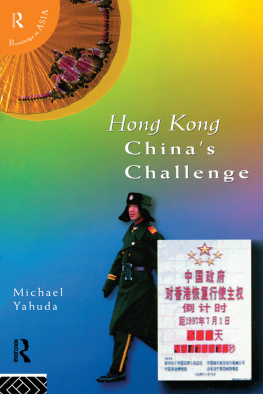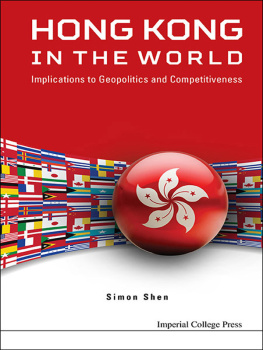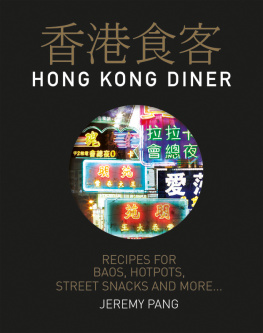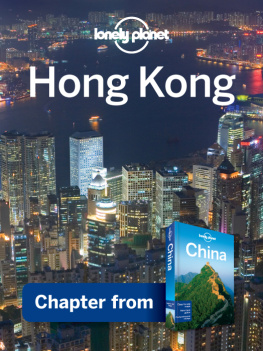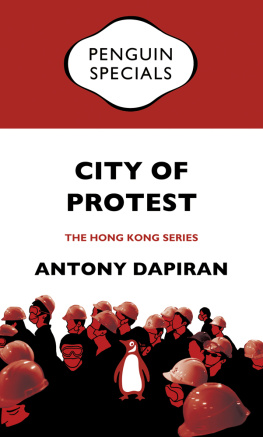HONG KONG FROM BRITAIN TO CHINA
To my parents
who struggled to bring up their children during the harsh and difficult years of postwar Hong Kong
Hong Kong from Britain to China
Political cleavages, electoral dynamics and institutional changes
Li Pang-Kwong
Lingnan University
Hong Kong
First published 2000 by Ashgate Publishing
Reissued 2018 by Routledge
2 Park Square, Milton Park, Abingdon, Oxon OX14 4RN
711 Third Avenue, New York, NY 10017, USA
Routledge is an imprint of the Taylor & Francis Group, an informa business
Copyright Li Pang-Kwong 2000
All rights reserved. No part of this book may be reprinted or reproduced or utilised in any form or by any electronic, mechanical, or other means, now known or hereafter invented, including photocopying and recording, or in any information storage or retrieval system, without permission in writing from the publishers.
Notice:
Product or corporate names may be trademarks or registered trademarks, and are used only for identification and explanation without intent to infringe.
Publisher's Note
The publisher has gone to great lengths to ensure the quality of this reprint but points out that some imperfections in the original copies may be apparent.
Disclaimer
The publisher has made every effort to trace copyright holders and welcomes correspondence from those they have been unable to contact.
A Library of Congress record exists under LC control number: 99075552
ISBN 13: 978-1-138-70037-6 (hbk)
ISBN 13: 978-1-315-20478-9 (ebk)
This book is developed from my Ph.D. thesis on elections and political mobilization in Hong Kong submitted to the London School of Economics and Political Science. Thanks are therefore due to my supervisors, Professors Tom Nossiter and Michael Yahuda. I would also like to express my gratitude to the following individuals for granting me an interview: Philip C.K. Kwok, Allen Lee, Patrick Shiu Kin-ying and Tsang Yok-sing; and to the following political groups for supplying the relevant information: the Democratic Alliance for Betterment of Hong Kong, the Democratic Party, the Hong Kong Democratic Foundation, the Liberal Democratic Federation of Hong Kong, the Liberal Party, the New Hong Kong Alliance, and the Reform Club of Hong Kong; and for election data: the Registration and Electoral Office, Constitutional Affairs Branch (Bureau), Hong Kong Government Secretariat.
In the process of revising the manuscript, the institutional change of Hong Kong has been included as one of the main components of this book. As a result, I carried on board my relevant works on institutional design and electoral change of Hong Kong. The author therefore thanks The Chinese University Press for permission to reuse the following articles in : Pang-kwong Li and David Newman, "Give and Take: Electoral Politics in Transitional Hong Kong," Asian Perspective 21 (1997):213-32.
Tribute must also be paid to Brian Bridges, Pun Wing-chung and Raymond Yeung Wai-man for their advice, comments and criticisms; to Ada Yeung Shui-yin for editorial assistance; to Carmen Chung Sui-lin, Jennifer Lee Fung-yee, Anthony Ng Kwai-wah and Stella Yu Lai-ngo for their unfailing support and assistance. The usual disclaimer applies.
My deepest thanks should go to my parents and family members for their continuous support, concern and encouragement; to my wife, Oi-ling, and my daughter, Wan-yi, who have suffered from my busy academic life and endless public engagements. Without their support and understanding, this book project could not have come into reality.
Li Pang-kwong
June 1999
- 123DA 123 Democratic Alliance
- BL Basic Law
- BLCC Basic Law Consultation Committee
- BLDC Basic Law Drafting Committee
- CCP Chinese Communist Party
- CDO City District Officer Scheme
- CE Chief Executive
- CPPCC Chinese People's Political Consultative Conference
- CRC Cooperative Resources Centre
- DAAs District Affairs Advisors
- DAB Democratic Alliance for Betterment of Hong Kong
- DBs District Boards
- DP Democratic Party
- EC Election Committee
- ExCo Executive Council
- FC Functional Constituency
- FTU Federation of Trade Unions
- HKAAs Hong Kong Affairs Advisors
- HKADPL Hong Kong Association for Democracy and People's Livelihood
- HKAS Hong Kong Affairs Society
- HKASPDMC Hong Kong Alliance in Support of the Patriotic Democratic Movement in China
- HKCA Hong Kong Civic Association
- HKCF Hong Kong Citizen Forum
- HKDF Hong Kong Democratic Foundation
- HKMAO Hong Kong and Macau Affairs Office
- HKO Hong Kong Observers
- HKPA Hong Kong Progressive Alliance
- HKPTU Hong Kong Professional Teachers' Unions
- HKSAR Hong Kong Special Administrative Region
- HOS Home Ownership Scheme
- JD Sino-British Joint Declaration
- JLG Joint Liaison Group
- KMT Kuomintang
- KTMCA Kwun Tong Man Chung Association
- LDF Liberal Democratic Federation
- LegCo Legislative Council
- MP Meeting Point
- NCNA New China News Agency
- NHKA New Hong Kong Alliance
- NPC National People's Congress
- NTA New Territories Alliance
- NTAS New Territories Association of Societies
- NWSC Neighbourhood and Workers Service Centre
- OR October Review
- PE Popular Election
- PHKS Progressive Hong Kong Society
- PRC People's Republic of China
- PSPS Private Sector Participation Scheme
- PWC Preliminary Working Committee
- RCHK Reform Club of Hong Kong
- RegCo Regional Council
- SCOPG Standing Committee on Pressure Groups
- SoCO Society for Community Organisation
- TUC Trades Union Council
- UA United Ants
- UDHK United Democrats of Hong Kong
- UrbCo Urban Council
After more than 150 years of British rule, Hong Kong has become a part of China since July 1997. The transition from a British colony to a Chinese special administrative region was not only a transfer of sovereignty, but also touched upon a very important issue of political transition generated by the Sino-British Joint Declaration signed in December 1984. The Sino-British Joint Declaration had provided an impetus to reform the colonial political structure by the injection of election into the political system. Later in 1990, the Basic Law (the mini-constitution for post-1997 Hong Kong) had furthered a step by stipulating that the Chief Executive (CE) and all the LegCo members of the Hong Kong Special Administrative Region (HKSAR) be ultimately returned by popular election. The transformation of the mode of political recruitment through appointment to one through election has redefined the rule of the political game and the associated value system and norms of behaviour.
From an institutional perspective, the introduction of popular election into the District Boards (DBs) and the Legislative Council (LegCo) in 1982 and 1991, respectively, had kicked off a long process of political transformation. However, political change in Hong Kong in the 1980s and 1990s has its uniqueness. First of all, it is clear that Hong Kong would never have become an independent state after the "decolonization" process. Chinese government, whether under the rule of the Kuomintang (KMT) or the Chinese Communist Party (CCP), has never failed to assert its sovereignty over Hong Kong and has claimed to be able to restore it when they think fit. Unlike other British colonies, therefore, the transfer of power has not been from the colonial government to the native people but to another sovereign state--China. Thus, the normal Westminster decolonization process leading to the establishment of a parliamentary sovereign state would not happen in Hong Kong. The destiny of Hong Kong was finally fixed in 1984 when Britain agreed to return Hong Kong to China in 1997.


